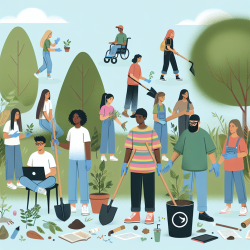Introduction
The COVID-19 pandemic has reshaped many aspects of our lives, influencing how we perceive and express gratitude. A recent study, "Gratitude for Categories of Needs Before and During the COVID-19 Pandemic," provides valuable insights into how societal events impact expressions of gratitude, particularly through the lens of Maslow's Theory of Motivation. This research is crucial for practitioners in speech-language pathology and other fields focused on child development, as it highlights the potential of gratitude to foster resilience and growth, even in challenging times.
The Study: A Brief Overview
The study analyzed expressions of gratitude from an online forum over three periods: two years pre-pandemic, one year pre-pandemic, and during the pandemic. Using Maslow's hierarchy of needs, the researchers categorized gratitude expressions into deficiency needs (e.g., physiological, safety, love and belongingness, esteem) and growth needs (e.g., cognitive, aesthetic, self-actualization, transcendence). The findings revealed a notable shift towards gratitude for growth needs during the pandemic, suggesting a heightened focus on personal development amidst adversity.
Implications for Practitioners
For practitioners in speech-language pathology, these findings underscore the importance of integrating gratitude practices into therapeutic settings. By encouraging children to express gratitude, practitioners can help them develop resilience and a growth mindset. Here are some practical strategies:
- Gratitude Journals: Encourage children to keep a gratitude journal, where they can regularly note things they are thankful for, focusing on both deficiency and growth needs.
- Gratitude Exercises: Implement exercises that prompt children to reflect on and express gratitude for their learning experiences and personal growth.
- Role-Playing: Use role-playing activities to help children express gratitude in various scenarios, enhancing their interpersonal skills and empathy.
Encouraging Further Research
While this study provides valuable insights, it also opens avenues for further research. Practitioners are encouraged to explore how gratitude expressions can be tailored to different cultural and socioeconomic contexts. Additionally, investigating the long-term effects of gratitude practices on child development can provide deeper insights into their benefits.
Conclusion
The COVID-19 pandemic has highlighted the transformative power of gratitude, particularly in fostering growth and resilience. By incorporating gratitude practices into therapeutic settings, practitioners can support children in navigating challenges and achieving personal growth. For those interested in delving deeper into the research, the original study offers a comprehensive analysis of gratitude expressions during this unprecedented time.
To read the original research paper, please follow this link: Gratitude for Categories of Needs Before and During the COVID-19 Pandemic.










